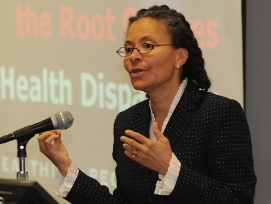College Site | Development | TOC - Department Dev Sites | CLHS TOC | Center for Law, Health & Society | News and Events | Center News | Racial Disparities in Infant Health Racial Disparities in Infant Health
March 25, 2010
Successful Atlanta a ttorney and executive Kim Anderson thought she had done everything right during her pregnancy. She exercised regularly, ate well, and took the precautions necessary to ensure the health of her child, including regular doctor visits. Despite the precautions, her pregnancy ended 2.5 months early and she risked losing her premature baby. She did not know it at the time, but her experience mimicked that of many African-American women.
ttorney and executive Kim Anderson thought she had done everything right during her pregnancy. She exercised regularly, ate well, and took the precautions necessary to ensure the health of her child, including regular doctor visits. Despite the precautions, her pregnancy ended 2.5 months early and she risked losing her premature baby. She did not know it at the time, but her experience mimicked that of many African-American women.
Anderson, chief executive officer of Families First, told her story as part of a three-part noontime spring speaker series co-hosted by the Center and a variety of student organizations. The series included a special screening of an episode from the PBS documentary "Unnatural Causes: Is Inequality Making Us Sick?" and featured four Atlanta experts, including Anderson, who were interviewed for the episode.
 The documentary followed the birth outcomes experienced by African-American women at every socioeconomic level, compared with white women. Moderated by law students, the series introduced the national research on health disparities and encouraged reflection on ways that lawyers might address this societal challenge.
The documentary followed the birth outcomes experienced by African-American women at every socioeconomic level, compared with white women. Moderated by law students, the series introduced the national research on health disparities and encouraged reflection on ways that lawyers might address this societal challenge.
Fleda Mask Jackson, a senior scientist of the Atlanta Regional Health Forum and an affiliated Emory University professor, provided a research perspective. She explained, "Regardless of education, finances, or social status, African-American women are more likely than any other race to experience premature births and infant mortality." She added that neither biology nor differences in socioeconomic status can explain the higher rates. Scientific and professional studies conducted have led researchers to believe that the cumulative stress of racism experienced by African-American women over their lifetimes may account for these disparities.
Speaker Dr. Carol Rowland Hogue, a professor and Director of the Women's and Children's Center at Emory University, led the initial innovative research on racial disparities in preterm delivery that found that college-educated African-American women have a three-fold risk of very preterm delivery when compared to college-educated white women.
 Dr. Camara Phyllis Jones, Research Director on Social Determinants of Health and Equity for the CDC, said there is a clear distinction between social determinants of health and equity, but both are derived from the same root - racism. Reiterating the purpose of the series, she stated to an audience composed of law students, faculty, and visitors, "You all are at the core of the solution."
Dr. Camara Phyllis Jones, Research Director on Social Determinants of Health and Equity for the CDC, said there is a clear distinction between social determinants of health and equity, but both are derived from the same root - racism. Reiterating the purpose of the series, she stated to an audience composed of law students, faculty, and visitors, "You all are at the core of the solution."
"The Interplay Between Race and Health: Racial Disparities in Infant Health"
Student Organization Co-sponsors:
- Black Law Students Association
- Child Advocacy Society
- Law Students for Reproductive Justice
- Public Interest Law Association
- Student Health Law Association